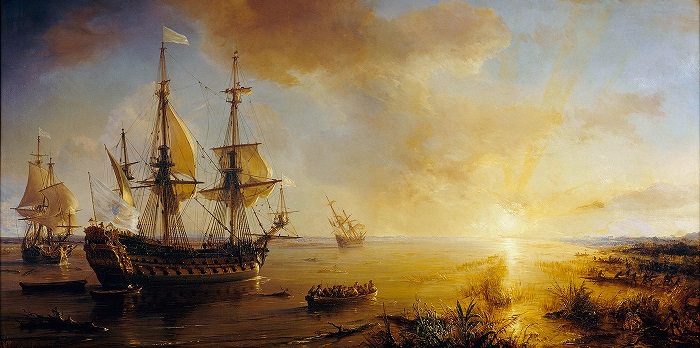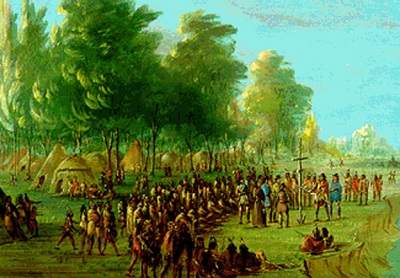Might not the unhappy colonists left on the shores of Texas still be rescued from destruction?
Previously in The Discovery of the Great West.

Public domain image from Wikipedia.
Our special project presenting the definitive account of France in Canada by Francis Parkman, one of America’s greatest historians.
First, we conclude Chapter 28.
Now, at length, they disburdened themselves of their gloomy secret; but the sole result seems to have been an order from the King for the arrest of the murderers, should they appear in Canada.[1] Joutel was disappointed. It had been his hope throughout that the King would send a ship to the relief of the wretched band at Fort St. Louis of Texas. But Louis XIV. hardened his heart, and left them to their fate.
[1: Lettre du Roy à Denonville, 1 Mai, 1689. Joutel must have been a young man at the time of the Mississippi expedition; for Charlevoix saw him at Rouen, thirty-five years after. He speaks of him with emphatic praise; but it must be admitted that his connivance in the deception practised by Cavelier on Tonty leaves a shade on his character, as well as on that of Douay. In other respects, everything that appears concerning him is highly favorable, which is not the case with Douay, who, on one or two occasions, makes wilful misstatements.
Douay says that the elder Cavelier made a report of the expedition to the minister Seignelay. This report remained unknown in an English collection of autographs and old manuscripts, whence I obtained it by purchase, in 1854, both the buyer and seller being at the time ignorant of its exact character. It proved, on examination, to be a portion of the first draft of Cavelier’s report to Seignelay. It consists of twenty-six small folio pages, closely written in a clear hand, though in a few places obscured by the fading of the ink, as well as by occasional erasures and interlineations of the writer. It is, as already stated, confused and unsatisfactory in its statements; and all the latter part has been lost. On reaching France, he had the impudence to tell Abbé Tronson, Superior of St. Sulpice, “qu’il avait laissé M. de la Salle dans un très-beau pays avec M. de Chefdeville en bonne santé.” — Lettre de Tronson à Mad. Fauvel-Cavelier, 29 Nov., 1688.
Cavelier addressed to the King a memorial on the importance of keeping possession of the Illinois. It closes with an earnest petition for money in compensation for his losses, as, according to his own statement, he was completely épuisé. It is affirmed in a memorial of the heirs of his cousin, François Plet, that he concealed the death of La Salle some time after his return to France, in order to get possession of property which would otherwise have been seized by the creditors of the deceased. The prudent abbé died rich and very old, at the house of a relative, having inherited a large estate after his return from America. Apparently, this did not satisfy him; for there is before me the copy of a petition, written about 1717, in which he asks, jointly with one of his nephews, to be given possession of the seigniorial property held by La Salle in America. The petition was refused.
Young Cavelier, La Salle’s nephew, died some years after, an officer in a regiment. He has been erroneously supposed to be the same with one De la Salle, whose name is appended to a letter giving an account of Louisiana, and dated at Toulon, 3 Sept., 1698. This person was the son of a naval official at Toulon, and was not related to the Caveliers.]

Public domain image from Free-Images.com.
Henri De Tonty, on his rock of St. Louis, was visited in September by Couture and two Indians from the Arkansas. Then, for the first time, he heard with grief and indignation of the death of La Salle, and the deceit practiced by Cavelier. The chief whom he had served so well was beyond his help; but might not the unhappy colonists left on the shores of Texas still be rescued from destruction? Couture had confirmed what Cavelier and his party had already told him, that the tribes south of the Arkansas were eager to join the French in an invasion of northern Mexico; and he soon after received from the governor, Denonville, a letter informing him that war had again been declared against Spain. As bold and enterprising as La Salle himself, Tonty resolved on an effort to learn the condition of the few Frenchmen left on the borders of the Gulf, relieve their necessities, and, should it prove practicable, make them the nucleus of a war-party to cross the Rio Grande, and add a new province to the domain of France. It was the revival, on a small scale, of La Salle’s scheme of Mexican invasion; and there is no doubt that, with a score of French musketeers, he could have gathered a formidable party of savage allies from the tribes of Red River, the Sabine, and the Trinity. This daring adventure and the rescue of his suffering countrymen divided his thoughts, and he prepared at once to execute the double purpose.[350]
[350] Tonty, Mémoire.]
He left Fort St. Louis of the Illinois early in December, in a pirogue, or wooden canoe, with five Frenchmen, a Shawanoe warrior, and two Indian slaves; and, after a long and painful journey, he reached the villages of the Caddoes on Red River on the twenty-eighth of March. Here he was told that Hiens and his companions were at a village eighty leagues distant; and thither he was preparing to go in search of them, when all his men, excepting the Shawanoe and one Frenchman, declared themselves disgusted with the journey, and refused to follow him. Persuasion was useless, and there was no means of enforcing obedience. He found himself abandoned; but he still pushed on, with the two who remained faithful. A few days after, they lost nearly all their ammunition in crossing a river. Undeterred by this accident, Tonty made his way to the village where Hiens and those who had remained with him were said to be; but no trace of them appeared, and the demeanor of the Indians, when he inquired for them, convinced him that they had been put to death. He charged them with having killed the Frenchmen, whereupon the women of the village raised a wail of lamentation; “and I saw,” he says, “that what I had said to them was true.” They refused to give him guides; and this, with the loss of his ammunition, compelled him to forego his purpose of making his way to the colonists on the Bay of St. Louis. With bitter disappointment, he and his two companions retraced their course, and at length approached Red River. Here they found the whole country flooded. Sometimes they waded to the knees, sometimes to the neck, sometimes pushed their slow way on rafts. Night and day it rained without ceasing. They slept on logs placed side by side to raise them above the mud and water, and fought their way with hatchets through the inundated cane-brakes. They found no game but a bear, which had taken refuge on an island in the flood; and they were forced to eat their dogs.
– The Discovery of the Great West, Chapter 29 by Francis Parkman
| <—Previous | Master List | Next—> |
The below is from Francis Parkman’s Introduction.
If, at times, it may seem that range has been allowed to fancy, it is so in appearance only; since the minutest details of narrative or description rest on authentic documents or on personal observation.
Faithfulness to the truth of history involves far more than a research, however patient and scrupulous, into special facts. Such facts may be detailed with the most minute exactness, and yet the narrative, taken as a whole, may be unmeaning or untrue. The narrator must seek to imbue himself with the life and spirit of the time. He must study events in their bearings near and remote; in the character, habits, and manners of those who took part in them, he must himself be, as it were, a sharer or a spectator of the action he describes.
With respect to that special research which, if inadequate, is still in the most emphatic sense indispensable, it has been the writer’s aim to exhaust the existing material of every subject treated. While it would be folly to claim success in such an attempt, he has reason to hope that, so far at least as relates to the present volume, nothing of much importance has escaped him. With respect to the general preparation just alluded to, he has long been too fond of his theme to neglect any means within his reach of making his conception of it distinct and true.
MORE INFORMATION
TEXT LIBRARY
Here is a Kindle version: Complete Works for just $2.
- Here’s a free download of this book from Gutenberg.
- René-Robert Cavelier, Sieur de La Salle.
- History and Culture of the Mississippi River.
- French Explorers of North America
MAP LIBRARY
Because of lack of detail in maps as embedded images, we are providing links instead, enabling readers to view them full screen.
- French Canada in 1688.
- French Explorations of Mississippi River..
- Native Populations.


Leave a Reply
You must be logged in to post a comment.